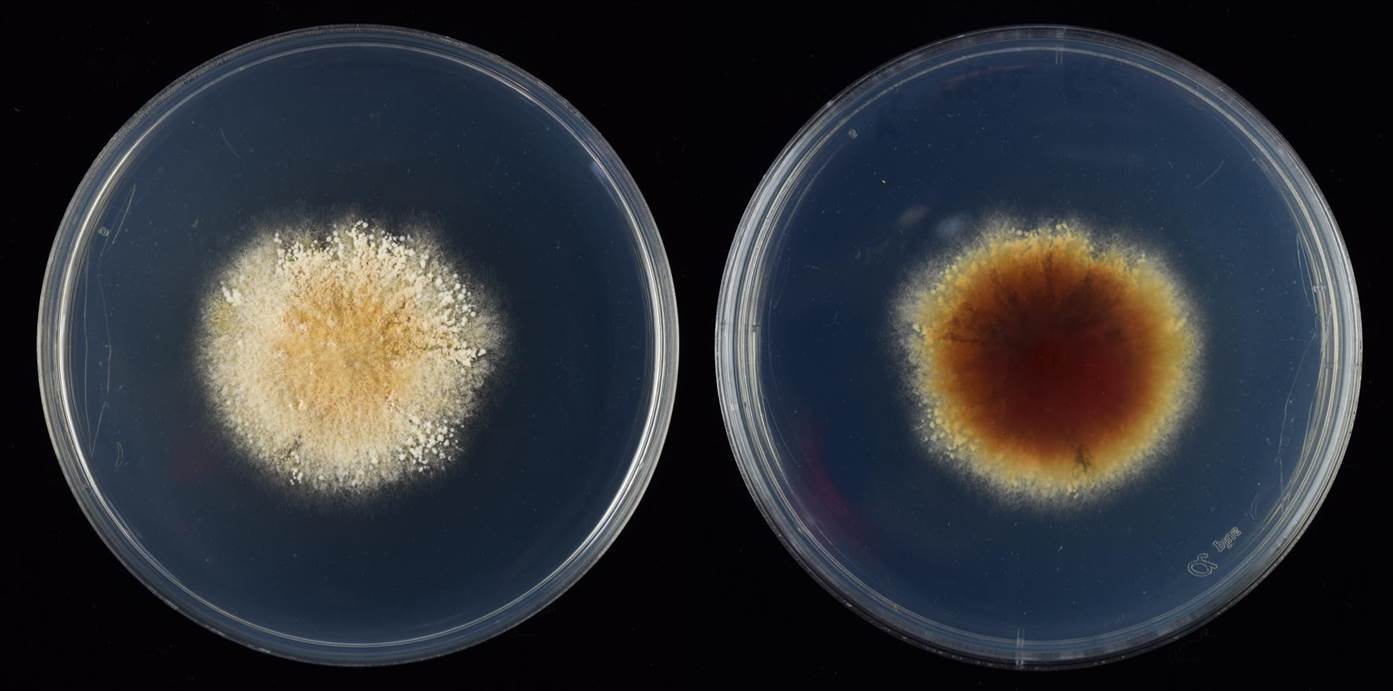| Authors | (Sacc.) Aveskamp, Gruyter & Verkley 2010 |
|---|---|
| Strain | 14130 |
| Classification | Pleosporales, Didymellaceae, Epicoccum |
| Culture collection | BCRC FU31413 |
| Detection frequency | Medium |
| Figure |  Fig. 1 5-day-old colony on PDA Fig. 1 5-day-old colony on PDA  Fig. 2 Epicoccum sorghinum. a. Pycnidia on PDA. b, c. Chlamydospores. d. Pycnidial wall and ostiole. e. Conidia (Bars= 5 μm, unless otherwise specified) Fig. 2 Epicoccum sorghinum. a. Pycnidia on PDA. b, c. Chlamydospores. d. Pycnidial wall and ostiole. e. Conidia (Bars= 5 μm, unless otherwise specified) |
| Colonies | Colonies on PDA attaining 46-mm at 25 °C after 5 days, cottony, pale brown, often with white granules and brown or red exudates diffusing into the medium, margins entire, turning filiform with age. |
| Pycnidia | Pycnidia globose or subglobose, brown, ostiolate, glabrous, superficial or submerged, often in groups, up to 250 µm in diam. |
| Conidia | Conidia ovoid, fusiform or ellipsoidal, hyaline, often with 2 tiny guttules, 3.5–4.5(–5) × 1.5–2.0(–2.5) µm. |
| Chlamydospores | Chlamydospores globose, subglobose or cylindrical, dark brown, guttulate, intercalary or terminal, mostly in chains of 2–9 cells, 8–12 × 5–9(–11) µm. |
| Note | This species produces Phoma-like pycnidia, and was originally named as Phoma sorghina. Based on phylogenetic analysis (Aveskamp et al., 2009), this species has been transferred to the genus Epicoccum, which is characterized by having brown dictyoseptate conidia sometimes with Phoma-like synanamorph. However, this species has only Phoma-like anamorph. This species is commonly associated with sorghum grains. Brown diffusible pigment was produced on the PDA medium, which turned yellow in acid conditions (Boerema et al., 1977). Mycotoxin, namely tenuazonic acid, was produced on sorghum grains (Oliveira et al., 2017). |
| Pathogenicity | This species has been reported to cause glume blight and grain discoloration on rice (Ou, 1985), and also frequently been found on other Poaceae hosts(Boerema et al., 1977). |
| Specimens examined | Taiwan, Taitung County, rice grains (cultivar Taitung 30), Jan 2014, Jie-Hao Ou, 14009 Taiwan, Kaohsiung City, rice grains, Jan 2014, Jie-Hao Ou, 14028 Taiwan, Taitung County, rice grains (cultivar Taiken 2), Sep 2014, Jie-Hao Ou, 14122 Taiwan, Miaoli County, rice grains (cultivar Miaoli 2), Dec 2014, Jie-Hao Ou, 14192 |
| ITS | CTTTGCCTGCTATCTCTTACCCATGTCTTTTGAGTACCTTACGTTTCCTCGGTGGGTTCGCCCACCGATTGGACAAATTTAAACCCTTTGCAGTTGAAATCAGCGTCTGAAAAAACTTAATAGTTACAACTTTCAACAACGGATCTCTTGGTTCTGGCATCGATGAAGAACGCAGCGAAATGCGATAAGTAGTGTGAATTGCAGAATTCAGTGAATCATCGAATCTTTGAACGCACATTGCGCCCCTTGGTATTCCATGGGGCATGCCTGTTCGAGCGTCATTTGTACCTTCAAGCTCTGCTTGGTGTTGGGTGTTTGTCTCCTGTAGACTCGCCTTAAAACAATTGGCAGCCGGCGTATTGATTTCGGAGCGCAGTACATCTCGCGCTTTGCACTCATAACGACGACATCCAAAAGTACATTTTTACACTCTTGACCTCGGATCAGGTAGGGATACCCGCTGAACTTAA |